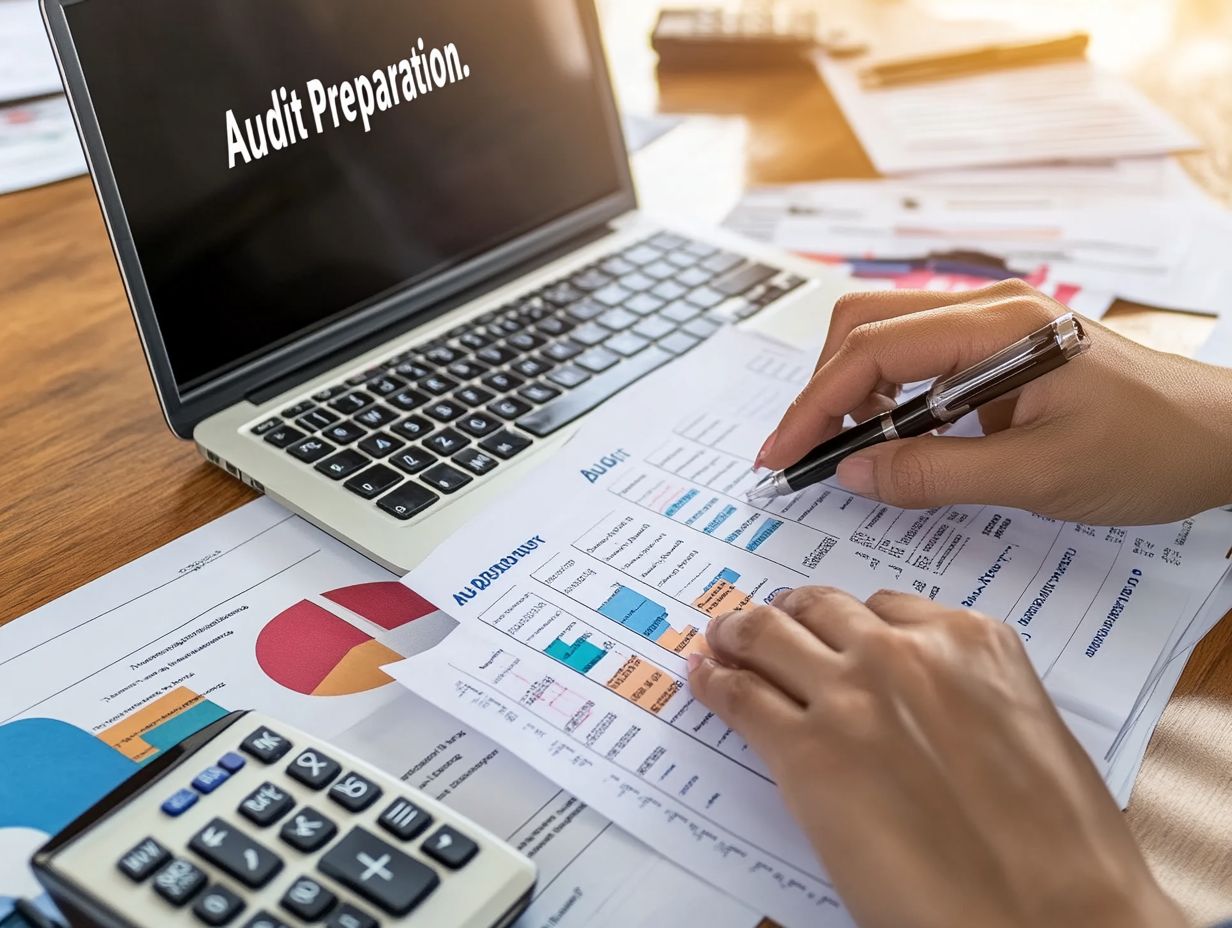How to Prepare for a Financial Audit?
Preparing for a financial audit may feel overwhelming. However, grasping its purpose and process is essential for navigating it with confidence.
This article outlines what a financial audit entails, the various types you may encounter, and the advantages of being thoroughly prepared. It also includes a comprehensive financial audit checklist.
From ensuring accuracy and compliance to pinpointing opportunities for improvement, preparation plays a pivotal role in the audit process. This is especially true through effective documentation gathering.
You ll discover crucial steps to take, strategies for effective collaboration with an audit team, and the significant impact a proactive approach can have on the outcome.
Get ready to explore the world of financial audits!
Contents
- Key Takeaways:
- Understanding Financial Audits
- Benefits of Preparing for a Financial Audit
- Steps to Prepare for a Financial Audit
- Working with an auditor
- Importance of Proper Financial Audit Preparation
- Frequently Asked Questions
- How to Prepare for a Financial Audit?
- What is a financial audit?
- Why is it important to prepare for a financial audit?
- What steps can I take to prepare for a financial audit?
- How far in advance should I start preparing for a financial audit?
- What documents and information should I have ready for a financial audit?
Key Takeaways:

- Understand the purpose of a financial audit and different types to prepare accordingly.
- Preparing for a financial audit can help ensure accuracy and identify areas for improvement in your financial processes.
- Review documents and conduct internal audits to prepare for a financial audit. Communicate effectively and provide necessary information when working with an auditor.
Understanding Financial Audits
Grasping the intricacies of financial audits is vital for businesses aiming to ensure transparency and maintain the integrity of their financial operations. A financial audit is an independent examination of your financial statements.
It assesses their accuracy and compliance with established accounting standards like Generally Accepted Accounting Principles (GAAP).
By identifying potential risks and evaluating internal controls, audits enable you to uphold investor trust and satisfy regulatory requirements. This ultimately enhances your organization s financial health and operational efficiency through effective risk management.
What is a Financial Audit?
A financial audit is a meticulous process undertaken by an external auditor to assess your organization’s financial statements. This ensures they accurately reflect its financial position and performance.
This process serves several essential objectives, chiefly aimed at establishing the credibility of your financial reports. This is achieved through transaction testing, which enables stakeholders to make informed decisions.
The external auditor plays a pivotal role in this process, delivering an independent evaluation that helps uncover any discrepancies or areas of concern within the reporting.
The findings culminate in an audit report that enhances transparency and fosters trust among investors, regulators, and other stakeholders. This signals your organization s dedication to upholding financial integrity and adherence to financial regulations.
Types of Audits
There are various types of audits to consider, such as internal and external audits. Each serves distinct purposes in evaluating your organization s financial performance and risk management strategies.
Internal audits primarily focus on assessing the effectiveness of your organization’s internal controls, compliance with laws and regulations, and overall operational efficiency. This ensures robust audit preparation.
They provide valuable insights on potential improvements and risk mitigation, contributing to a more efficient audit process.
On the other hand, external audits, conducted by independent third parties, deliver an objective assessment of financial statements and compliance with general accounting principles. This external oversight boosts your credibility with stakeholders.
It also uncovers systemic risks that might escape notice internally, aiding in risk identification.
By grasping these differences, you can effectively leverage both types of audits to enhance your governance framework. This ensures robust financial health and compliance for your organization while aligning with regulatory compliance.
Benefits of Preparing for a Financial Audit
Preparing for a financial audit offers a wealth of advantages, including heightened accuracy in your financial reporting, improved compliance with regulations, and the opportunity to pinpoint areas ripe for operational enhancement through effective expense management.
By ensuring comprehensive audit readiness, you can streamline your financial operations and significantly enhance investor trust.
Ensuring Accuracy and Compliance

Ensuring accuracy and compliance during a financial audit is paramount for you, as it aligns your financial statements with accounting standards like GAAP (Generally Accepted Accounting Principles) and regulatory requirements.
This alignment not only promotes transparency but also cultivates trust among your stakeholders, including investors and regulatory bodies, enhancing financial integrity.
When you rigorously adhere to compliance checks, you signal your commitment to ethical practices and financial integrity. The reliability of your financial reporting becomes stronger, reducing the risks associated with inaccuracies or misrepresentation and ensuring effective audit steps.
Abiding by GAAP standards guarantees that your financial data is presented fairly and consistently while also enhancing your organization s reputation. By demonstrating accountability, you foster long-term stability in your financial health through transparent audit trails.
Identifying Areas for Improvement
Financial audits are your golden chance to discover areas for improvement in both your financial performance and operational efficiency, especially through thorough financial analysis.
By meticulously reviewing your financial records and operational processes, these assessments can reveal weaknesses that may not be immediately visible, promoting effective risk management.
This discovery phase is essential not just for compliance but also for establishing robust risk management strategies that help you mitigate potential financial threats.
The insights garnered from audit findings can pave the way for developing action plans designed to fortify your internal controls and establish a comprehensive audit process. As you implement these recommendations, you cultivate a culture of continuous improvement and enhance financial integrity.
This approach ultimately propels sustainable growth for your organization and aligns with your audit process efficiency.
Steps to Prepare for a Financial Audit
Preparing for a financial audit requires you to take several essential steps. Start by gathering comprehensive documentation, meticulously reviewing your financial statements, and ensuring full compliance with the relevant accounting standards and regulations.
Each of these actions plays a pivotal role in ensuring a smooth and successful audit process, facilitating effective audit communication.
Reviewing Financial Documents
Reviewing financial documents is an essential step in your audit preparation process, ensuring that your financial statements are accurate and complete while also supporting your compliance checks.
This meticulous process involves examining several key types of documents, such as income statements, balance sheets, and cash flow statements, which are critical for your financial audit checklist.
Each of these documents plays a vital role in your financial narrative and overall financial performance.
For example, income statements provide valuable insights into your profitability over a specific period, while balance sheets offer a snapshot of your financial position at a given moment.
Cash flow statements, on the other hand, reflect the movement of cash, showcasing how effectively your business manages its cash inflows and outflows, which is essential for expense management.
Together, these documents serve as the backbone of your audit readiness, enabling a thorough evaluation of your financial health and adherence to regulatory standards.
Conducting Internal Audits
Conducting reviews of your processes before a financial audit can significantly elevate your organization’s audit preparation by pinpointing potential risks and ensuring compliance with established financial operations.
This approach helps you find issues early. You can thoroughly scrutinize your internal controls and financial practices, providing a robust safety net against unforeseen problems that could affect overall performance and audit outcomes.
By implementing internal audits, you can discover discrepancies and inefficiencies early on. This sets the stage for a smoother external audit process and enhances audit communication.
The insights gained from these assessments foster a culture of accountability and transparency among your staff. This ultimately leads to improved regulatory compliance and better preparation for future external audits.
As you refine your operational processes, you not only mitigate risks but also demonstrate your commitment to sound financial governance. This enhances trust and confidence among investors and other stakeholders.
Addressing Potential Issues

Fixing issues found during prep is crucial for maintaining your financial performance and mitigating risks that could affect overall audit outcomes.
To tackle these issues effectively, prioritize implementing audit recommendations. Enhance your risk management practices and adhere to financial regulations.
Conduct a thorough analysis of the preliminary assessments. This will yield valuable insights into potential vulnerabilities and prepare you for comprehensive transaction testing.
Fostering a culture of continuous improvement ensures that your management teams are well-equipped to train staff in compliance procedures and risk identification. This enhances your audit process efficiency.
Regularly reviewing and updating internal controls aligns your processes with best practices. This creates a more resilient financial framework that supports your long-term success in the face of evolving financial regulations.
Working with an auditor
Team up with your auditor for a successful financial audit. Ensure clear communication and provide necessary information in a timely manner to facilitate a smooth and efficient audit process.
Communicating Effectively
Communicate clearly with auditors. This ensures your financial operations meet all necessary rules throughout the audit process.
Establish a structured communication framework. Include regular updates on financial statuses, project milestones, and potential issues. This proactive approach enhances transparency and fosters trust between your organization and the auditing team.
Addressing auditor inquiries promptly significantly reduces delays and misunderstandings. This paves the way for a smoother audit experience.
Create an environment where questions are welcomed and answered thoroughly. This enables auditors to gain deeper insights, ultimately leading to more accurate assessments and recommendations.
Providing Necessary Information
Providing the necessary information to the audit team is absolutely critical for facilitating the audit process and ensuring a comprehensive compliance assessment.
Present detailed financial documentation that includes balance sheets, income statements, and cash flow statements. Insights into your internal controls are crucial as they demonstrate how your financial data is safeguarded and managed.
Grant auditors access to the policies and procedures that govern your financial operations. Being transparent helps auditors evaluate your practices and improves your operations.
This can enhance your overall operational efficiency and ensure compliance. Act now to safeguard your financial future!
Importance of Proper Financial Audit Preparation
Proper financial audit preparation is essential for maintaining financial health, enhancing operational efficiency, and building investor trust through transparent reporting.
By carefully organizing and documenting your financial records, you lay the groundwork for a successful audit experience. This ultimately contributes to improved financial performance. A well-prepared audit uncovers potential discrepancies and highlights areas for improvement, ensuring compliance with financial regulations.
This diligence reinforces your organization s integrity, as stakeholders gain confidence in your financial practices. Investing time in thorough preparation helps you mitigate risks and enhances your reputation, making it a vital component of strategic planning and long-term sustainability.
Frequently Asked Questions

How to Prepare for a Financial Audit?
Preparing for a financial audit can be daunting. But with these tips, you can ensure a smooth and successful process!
What is a financial audit?
A financial audit is an independent examination of an organization’s financial records and statements. Its purpose is to ensure accuracy and compliance with regulations.
Why is it important to prepare for a financial audit?
Preparing for a financial audit helps ensure that your organization’s financial records are accurate. This preparation will help you pass the scrutiny of auditors and identify any potential issues before the audit takes place.
What steps can I take to prepare for a financial audit?
- Organize and review your financial records.
- Ensure compliance with regulations.
- Conduct a mock audit to identify areas of concern.
How far in advance should I start preparing for a financial audit?
It is recommended to start preparing for a financial audit at least several months in advance. This allows enough time to address any issues or discrepancies that may arise.
What documents and information should I have ready for a financial audit?
Be sure to have important documents ready for a financial audit, including:
- Financial statements
- Bank statements
- Payroll records
- Tax returns
- Relevant contracts or agreements
Start your preparation now to ensure a smooth audit!






